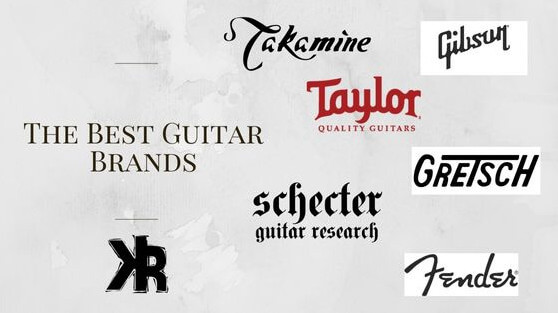Table of Contents
So, you’re on the hunt for a new guitar, congratulations! First, you need to know that not all guitars are created equal. And let’s face it, with a sea of brands out there, picking the right one can feel like finding a needle in a haystack.
But fret not! I’ve designed this Killer Rig article as your trusty roadmap to navigate through the maze of guitar brands. Who am I? I am Don East, a guitarist with over 20 years of playing experience.
And because I have handled many guitars over two decades, I will touch on everything from the craftsmanship that goes into each instrument, to the quality of materials, sound, and even the price tag! This guide has got you covered.
What Makes a Guitar Brand Stand Out?
I said earlier that not every guitar brand is created equal. So for a guitar brand to stand out involves several factors:
Sound and Tone
Sound and tone are arguably the most important factors that make a guitar brand stand out. Brands that consistently produce guitars with exceptional sound quality are often the most sought-after.
This involves not just the materials used, but also the guitar’s design and how well it’s put together.
The tone should be versatile enough to suit various styles of music, from rock and jazz to country and classical. The sound should also be consistent across different models offering something for everyone.
Quality of Materials
The constitution of the guitar, particularly the selection of wood and hardware components, is a pivotal factor in its long-term performance and resilience.
Woods like maple and mahogany are renowned for their robustness and their capacity to yield rich, deep tones.
Beyond the wood, the caliber of other components such as tuning machines, bridges, and internal wiring also contribute to the guitar’s overall functionality and longevity.
Craftsmanship
When it comes to craftsmanship, it’s important to make an instrument that feels good in your hands and endures the test of time, as well as one that looks nice.
This involves precision in cutting and shaping the wood, meticulous assembly, and a flawless finish. Brands that excel in craftsmanship often have a long history of guitar making and employ skilled artisans who are experts in their craft.
Price Range
A good guitar brand will offer instruments that cater to a wide range of budgets. While high-end models are expected to offer superior quality and features, entry-level guitars should also offer good value for the price.
Brands that provide a solid mix of price and quality across their product line are more appealing and attract a larger market.
Customer Service and Warranty
Last but not least, customer service and warranty terms are indicators of how much a brand stands behind its products.
A reliable warranty offers buyers peace of mind, knowing that any manufacturing defects or issues will be addressed.
Strong customer service, including easy access to support and prompt problem resolution, can turn a one-time buyer into a loyal customer.
Fender
The Fender Musical Instruments Corporation was founded in Fullerton, California, in 1946.
It has developed into one of the most well-known and respected guitar brands worldwide. Recognized mainly for its ground-breaking contributions to the electric guitar industry.
The brand has become synonymous with the rock and roll era. It’s widely regarded for shaping the sound of popular music throughout the 20th century.
Fender’s early success can be traced to the introduction of their first solid-body electric guitar. This is the Broadcaster, in 1950. This revolutionary design marked the beginning of Fender’s enduring legacy! As it paved the way for the creation of other iconic models.
Among these is the Stratocaster, first introduced in 1954. This became a staple for guitar legends for many decades.
Other notable models include the Jazzmaster, Jaguar, and Mustang. Each one embodying Fender’s commitment to innovation and excellence.
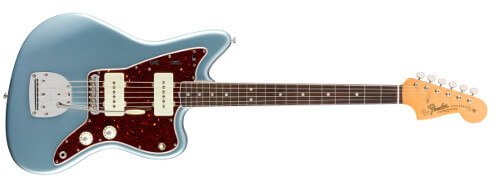
Popular Fender Guitars
Below is a table with some of the popular models that Fender makes. It also provides the music style that each guitar is made for:
| Model | Music Style |
|---|---|
| Stratocaster | Blues, Jazz, Indie, Reggae |
| Telecaster | Country, Folk, Punk, Rock |
| Jaguar | Alternative, Indie Rock |
| Jazzmaster | Surf Rock to Heavy Metal |
| Mustang | Jazz, Grunge, Rock |
Squier
I’m a guitarist with years of experience under my belt. So I’ve had the pleasure of playing countless guitars from various brands. One brand that has consistently stood out to me is Squier. Especially for those seeking affordability without sacrificing quality.
They were originally established in 1890 as a string manufacturer. Squier was acquired by Fender in 1965. They eventually became the go-to brand for budget-friendly Fender-style guitars.
As a subsidiary of Fender, Squier offers a fantastic range of instruments. Many lines that cater to both beginner and intermediate guitarists.
The brand takes pride in providing more affordable versions of Fender’s iconic models. These are models like the Stratocaster, Telecaster, Jazzmaster, and Jaguar.
Squier guitars maintain the classic aesthetics and tones of their Fender counterparts. All while offering a more wallet-friendly option!
This is excellent for players who are just starting out. Or even those who aren’t quite ready to invest in a higher-priced instrument.

Popular Squier Guitars
| Squier Series | Good For Music Types |
|---|---|
| Affinity Series | Pop, Rock, Blues |
| Classic Vibe Series | Classic Rock, Blues, Vintage Tones |
| Bullet Series | Beginners, Various Genres |
| Contemporary Series | Metal, Hard Rock, Modern Pop |
| Vintage Modified | Jazz, Classic Rock, Vintage Tones |
Gibson
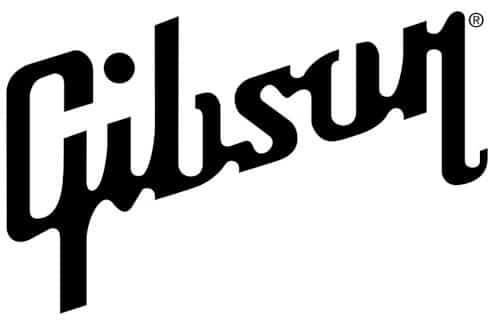
I’ve had the opportunity to explore a variety of instruments from numerous brands. Among these, Gibson holds a special place in my heart. This is due to its rich history and iconic models that have become staples in the world of guitar.
Established in 1902 by Orville Gibson in Kalamazoo, Michigan. Gibson has grown into one of the most respected and recognizable guitar brands worldwide.
Gibson’s reputation for innovation and quality craftsmanship is evident in their iconic models. These are guitars like the Les Paul, SG, ES-335, and Flying V. These guitars have been favored by legendary musicians across various genres.
All from blues and rock to jazz and country. As a guitarist, I’ve had the pleasure of playing many of these models. I can personally attest to the remarkable playability, tone, and versatility they offer. But they don’t come cheap!
Popular Gibson Guitars
| Gibson Model | Good For Music Types |
|---|---|
| Les Paul Standard | Rock, Blues, Jazz |
| SG Standard | Rock, Metal, Blues |
| Flying V | Metal, Hard Rock |
| Explorer | Hard Rock, Metal |
| Firebird | Blues, Rock, Alternative |
PRS
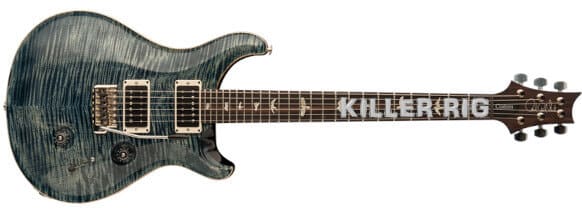
Among the many brands I have played over the years, PRS (Paul Reed Smith) guitars have captured my admiration. Mainly for their combination of modern craftsmanship, versatility, and exceptional playability.
The company was founded in 1985 by Paul Reed Smith in Annapolis, Maryland. PRS has quickly become one of the most respected guitar brands in the industry.
PRS’s dedication to innovation and quality is evident in their extensive lineup of guitars. This ranges from their flagship Custom 24 model to their more budget-friendly SE series. The brand has a special blend of traditional and modern features.
Things like the patented tremolo system, custom-wound pickups, and signature bird inlays. They have garnered widespread acclaim among guitarists of various styles and genres.
Popular PRS Guitars
PRS guitars are some of the top in the world! Here are their popular models and the music they are built for:
| PRS Model | Suited For Genres |
|---|---|
| Custom 24 | Rock, Blues, Jazz, Fusion, Pop |
| SE Series | Rock, Pop, Blues, Indie |
| McCarty | Classic Rock, Blues, Jazz |
| Hollowbody II | Jazz, Blues, Rock, Acoustic |
Ibanez

Ibanez has always stood out for its commitment to pushing the boundaries of guitar innovation. Offering a specific combination of progressive designs and exceptional playability.
Established in 1908 in Nagoya, Japan, Ibanez has grown into a global powerhouse. They are recognized and respected by guitarists worldwide.
Ibanez is famous for adopting extreme designs. They enjoy using state-of-the-art technology in their instruments. Their recognizable RG and S series guitars have ultra-thin necks and elegant contours.
But this has become synonymous with the brand. Ibanez also pioneered the development of the groundbreaking Edge tremolo system. Which has been widely praised for its stability and precision.
Popular Ibanez Guitars
| Model | Good For |
|---|---|
| RG Series | Metal, Shred |
| S Series | Versatile, Rock to Jazz |
| Artcore | Jazz, Blues |
| JEM | Shred, Virtuoso Playing |
Epiphone
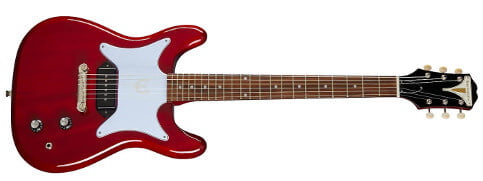
As a guitarist, Epiphone is one brand that consistently stands out to me. Mainly for its rich heritage, quality craftsmanship, and affordability. It was founded in 1873 by Anastasios Stathopoulos in Smyrna.
So clearly Epiphone has a long history of producing quality instruments. In 1957, the brand was acquired by Gibson.
Which further cemented its place as a reliable and trusted name in the guitar world.
Epiphone is renowned for offering more affordable versions of Gibson’s iconic instruments. Models such as the Les Paul, SG, and ES-335. These instruments maintain the classic aesthetics and characteristic tones of their Gibson counterparts.
But, all while providing a more budget-friendly option for players. Especially those who are just starting out or looking for a great value instrument.
Popular Epiphone Guitars
| Model | Good For |
|---|---|
| Les Paul Standard | Rock, Blues |
| SG Special | Rock, Metal |
| Casino | Jazz, Blues |
| Masterbilt Series | Acoustic genres |
Charvel
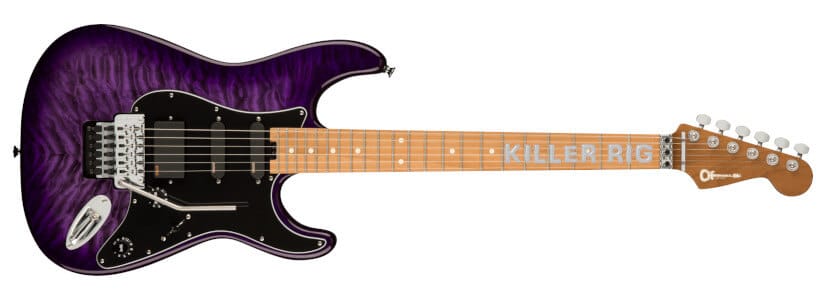
Charvel is another subsidiary of Fender, and they make high-end electric guitars. They’re based in Scottsdale, Arizona, and have been around since 1974. Charvel has always been synonymous with performance-driven innovation and playability.
Founded by Wayne Charvel in California, the brand has made a name for itself. All by catering to the needs of guitarists who demand exceptional performance and style from their instruments.
Charvel has been a trailblazer in guitar design! Blending classic elements with modern features. Primarily to create instruments tailored to the requirements of contemporary players.
The brand is particularly known for its “Superstrat” models, such as the So-Cal and San Dimas series.
They feature sleek body shapes, fast necks, and versatile pickup configurations. These guitars are designed to deliver high-octane performance and unbridled playability. This alone makes them ideal for players who push their instruments to the limit.
Popular Charvel Guitars
| Model | Good For |
|---|---|
| So-Cal Style 1 | Shred, Metal |
| San Dimas Style 1 | Rock, Metal |
| Pro-Mod DK24 | Fusion, Jazz-Rock |
ESP
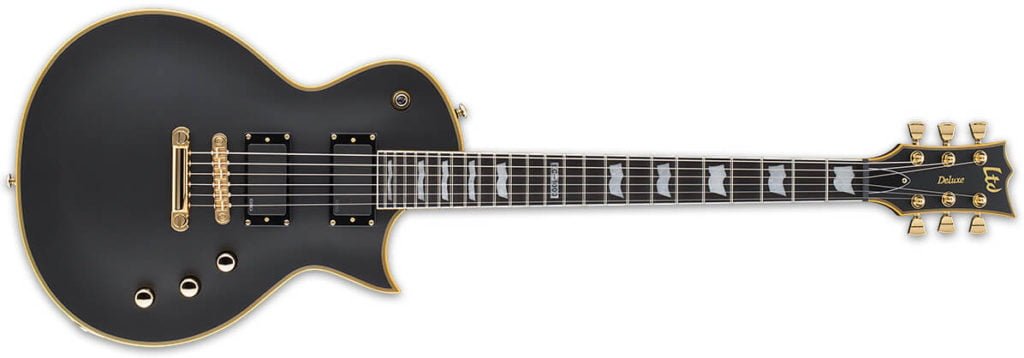
When talking about guitars, it’s impossible to ignore the impact ESP has had on the industry. Established in Tokyo, Japan in 1975, ESP has grown into a brand revered for its attention to detail.
But also bold aesthetics, and powerful sound. Guitarists seeking a specific instrument that speaks to their style have been drawn to ESP.
ESP is known for crafting instruments that don’t shy away from making a statement. Their iconic series like the Eclipse, Horizon, and Viper showcase daring shapes.
But also bold finishes that are designed to turn heads. But the brand doesn’t just rely on aesthetics. ESP guitars are made to perform! Offering players a responsive and powerful experience with every strum.
Popular ESP Guitars
| Model | Good For |
|---|---|
| Eclipse | Metal, Hard Rock |
| Horizon | Progressive Metal, Shred |
| EC-1000 | Versatile, All Genres |
| M-1000 | Speed Metal, Shred |
Schecter

What about guitar brands that cater specifically to the demands of metal players? Well, Schecter has earned its reputation as a top contender.
Founded in 1976 by David Schecter in California. This brand has consistently evolved to meet the changing needs of the heavy music community.
Schecter’s instruments are known for their aggressive aesthetics. But also powerful tones, and unwavering playability. It makes them an ideal choice for musicians looking to unleash their inner metal warrior.
Schecter’s lineup of guitars is designed with metal players in mind. Offering a variety of features that cater to the genre’s demands.
Their popular series, include the Hellraiser, Omen, and Damien. They boast high-output pickups, extended scale lengths, and even 7- and 8-string models.
All to accommodate the heaviest of riffing and the most intricate shredding. Each Schecter guitar is crafted to deliver the perfect balance of power, precision, and playability. Thus ensuring that every note resonates with clarity and authority.
Popular Schecter Guitars
| Model | Good For |
|---|---|
| Hellraiser | Metal, Hard Rock |
| Omen | Versatile, All Genres |
| C-1 Classic | Classic Rock, Blues |
| Demon | Metal, Shred |
Jackson

In the world of high-performance guitars, Jackson has carved out a unique space. They are the brand that epitomizes speed, power, and style. It was founded in 1980 by Grover Jackson in California.
With a reputation for creating instruments that cater to the aggressive playing styles of hard rock and metal guitarists.
But also their unmistakable aesthetics and relentless pursuit of performance. Jackson guitars have become a staple for musicians who seek to push the boundaries of their craft.
Popular Jackson Models
| Model | Good For |
|---|---|
| Rhoads | Heavy Metal, Shred |
| Soloist | Metal, Rock |
| Dinky | Versatile, All Genres |
| King V | Metal, Hard Rock |
Martin
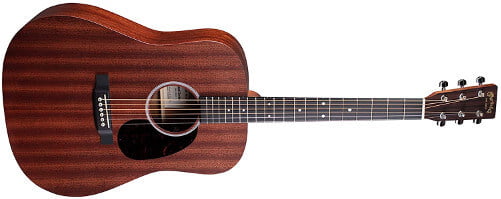
For generations, Martin has been synonymous with unparalleled acoustic guitar craftsmanship. But also rich, resonant tones. Founded in 1833 by C.F. Martin Sr. in Nazareth, Pennsylvania. The brand has remained a family-owned business.
Primarily dedicated to producing the finest acoustic instruments. With a storied history that spans nearly two centuries!
Martin has become a benchmark for quality. But also a favorite among discerning guitarists. Those who seek timeless sound and exceptional playability.
Martin’s commitment to excellence is evident in every aspect of their guitar-making process. Using only the highest quality tonewoods and precision craftsmanship. Martin has created some of the most iconic and revered acoustic guitar models in history.
From their legendary Dreadnought series, such as the D-18 and D-28. To the smaller body 000 and OM models. Martin guitars consistently deliver rich, balanced, and expressive tones. They have captivated musicians and audiences alike.
Popular Martin Guitars
| Model | Good For |
|---|---|
| D-28 | Folk, Bluegrass, Country |
| HD-28 | Versatile, All Genres |
| D-18 | Fingerstyle, Blues |
| D-15M | Folk, Fingerstyle |
Taylor

Established in 1974 by Bob Taylor and Kurt Listug in El Cajon, California. Taylor Guitars has grown to become one of the most respected names in the acoustic world.
Known for their blend of modern innovation, exceptional craftsmanship, and impeccable playability. Taylor’s guitars have become a favorite among musicians. Those who demand the best in both sound and performance.
Taylor’s dedication to quality and innovation is evident in every instrument they produce. They’re revolutionary designs, such as the proprietary NT neck and V-Class bracing. Showcase the brand’s commitment to quality.
They constantly push the boundaries of acoustic guitar construction. These innovations result in guitars that offer superior playability! But also remarkable tonal balance, and unparalleled sustain.
Popular Taylor Models
| Model | Good For |
|---|---|
| 814ce | Fingerstyle, Strumming |
| GS Mini | Travel, Beginners |
| 214ce | Versatile, All Genres |
| K24ce | Professional Performers |
Yamaha

With a history that spans over a century! Yamaha has earned a reputation for producing high-quality, versatile, and reliable instruments. And across a wide range of musical genres. Founded in 1887 by Torakusu Yamaha in Hamamatsu, Japan.
The company began with the production of pianos and organs before expanding into the world of guitars.
Today, Yamaha is a well-respected name in the guitar industry. Offering a diverse lineup of acoustic, electric, and classical guitars. But for players of all levels and styles.
One of Yamaha’s defining characteristics is their commitment to quality and playability. By combining traditional craftsmanship with modern manufacturing techniques. Yamaha has been able to produce instruments that consistently deliver.
In excellent tone, feel, and durability. And at an accessible price point. Their meticulous attention to detail.
Which includes the selection of tonewoods to the precise construction methods. Ensures that every Yamaha guitar meets the brand’s high standards.
Exploring the Yamaha Guitar Lineup
| Model | Good For |
|---|---|
| FG850 | Beginners, Strumming |
| Pacifica 112V | Rock, Blues |
| NTX1 | Classical, Fingerstyle |
| Revstar RS420 | Rock, Metal |
Gretsch
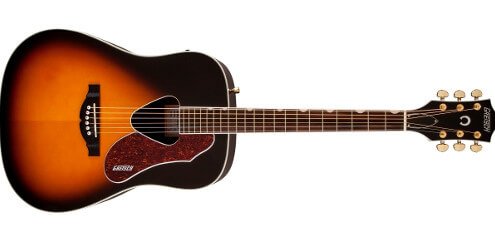
Gretsch is an American company that was founded in 1883 and is based out of Brooklyn, New York. They make electric and acoustic guitars. And just like Rickenbacker they are well known for their hollow-body guitars.
Gretsch is very unique in design, function, and sound. They also have some innovative parts like their Bigsby tremolo system.
Popular Gretsch Models
| Gretsch Model | Good For |
|---|---|
| G2622 Streamliner | Rock, Blues, Jazz |
| G2627T Streamliner | Rockabilly, Country |
| G2622LH Streamliner | Left-handed Players |
| G2622T Streamliner | Rock, Jazz, Country |
Conclusion
These are just fifteen of the best guitar brands in the world. Many other great companies out there didn’t make this list because it would be far too long!
If you’re looking for a new guitar, check out these brands and see what they have to offer. You never know, you might find your new favorite guitar!
FAQs
What is the most famous guitar brand?
There are many famous guitar brands! But some of the most well-known include Fender, Gibson, and Martin. These companies have been around for many years. They have built an excellent reputation for making high-quality instruments.
What are some good guitar brands for beginners?
If you’re a beginner, it’s important to find a guitar that is comfortable for you to play and is also affordable. Some good guitar brands for beginners include Squier, Epiphone, and Ibanez.
These companies make great entry-level instruments that will last you many years. As you continue to improve your guitar-playing skills.
Which brand sells the most guitars?
NAMM (National Association of Music Merchants) had surveyed 2000 American music store owners and discovered that the top-selling guitar brands were as follows:
- Gibson: 34%
- Fender: 30%
- Ibanez: 12%
- Yamaha: 7%
- Epiphone: 4%
- Other (includes PRS, Charvel, ESP, Jackson, Schecter): 9%
This alone tells us that the guitar buying population prefers certain brands to others.

